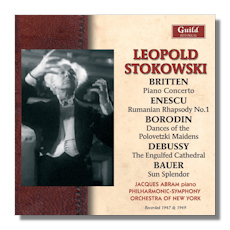
The Internet's Premier Classical Music Source
Related Links
-
Borodin Reviews
Britten Reviews
Debussy Reviews
Enescu Reviews - Latest Reviews
- More Reviews
-
By Composer
-
Collections
DVD & Blu-ray
Books
Concert Reviews
Articles/Interviews
Software
Audio
Search Amazon
Recommended Links
Site News
 CD Review
CD Review
Stokowski In Concert

- George Enescu: Rumanian Rhapsody #1 (20 Feb 1947)
- Alexander Borodin: Dance of the Polovetzki Maidens (27 Nov 1949)
- Claude Debussy: The Engulfed Cathedral (13 Feb 1947)
- Marion Bauer: Sun Splendor (25 Oct 1947)
- Benjamin Britten: Piano Concerto (27 Nov 1949)
Jacques Abram, piano
Philharmonic-Symphony Orchestra of New York/Leopold Stokowski
Guild GHCD2419
After an initial evening's concert, listening to this disc, I began to think about audience response and what it says about their feelings about the music. I noticed, for example, that their applause at the end of the Enescu was enthusiastic whereas in the Britten it was polite…and my initial response to the Britten was that it treated the piano too much like a percussive instrument…Bartok without his sense of Hungarian rhythm…I considered checking into other recordings to see if other players treated it as percussive as did this one and first checked into who the soloist was in Britten's own recording only to discover it was the same one as here…so, then I got sidetracked into a live Britten "Young Person's Guide…" with Stokowski in 1963 and here the audience was enthusiastic again…in both cases you can envision the audience standing…not in the Piano Concerto, however, and now I don't know if I should check out another pianist or simply write off the piece as too percussive…the odds are in favor of curiosity…any recommendations welcome.
Nobody did Enescu better than Stokowski and this is an exciting, visceral experience.
If your only familiarity with the Borodin is the usual stuff, like in Stokowski's stereo recording from Phase 4 or Beecham…this is not the same music…there is much more here and it is darker and more Russian and Oriental and more like the Enescu than what you may be used to and it is great…an ear opener…it, too was welcomed with enthusiastic applause.
You probably already have a recording of Stokowski's The Engulfed Cathedral and this one offers no new insights. It does occur to me, however, that this is not Stokowski/Debussy but Stokowski. Unlike Stokowski's transcription of Clair de Lune this is more like Mussorgsky.
The Marion Bauer Sun Splendor is another example of Stokowski championing new music. Of course that notion has to be tempered with the knowledge that Stokowski championed Rachmaninoff and Ravel since they were "new" once too. The music includes American Indian drumming and is impressionistic. At one moment I wrote "sounds like plasma forming". It's not particularly memorable but I'm glad to have it in my collection. I checked and this is the only recording of the piece and was the world premiere of the orchestral version (the score was not, in fact, at that time published according to the notes).
The Britten is introduced by an announcer with the usual palaver. The piece is simply too percussive for me. It sounds a lot like Prokofiev's Piano Concerto #3 (as well as Bartók, see above). It also has a noir feel to it. Other comments are in the 'stream of consciousness' first section.
The orchestra is the NYPO of today. Sound is a little grainy but clear and typical of the broadcast sound of the period. Notes are interesting and informative.
Walter Benjamin's lament in the 1930s about death still rings true. By avoiding the sight of the dying, he felt, one misses the moment when the meaning of a life is completed and illuminated in its ending. The denial of death then leads to the demise of the art of storytelling. He called his contemporaries "dry dwellers of eternity" because they "live in rooms that have never been touched by death."
Isn't that what we all want: to be remembered? And not just as a disembodied soul, but as a breathing being who once walked the earth?
Copyright © 2015, Robert Stumpf II





















